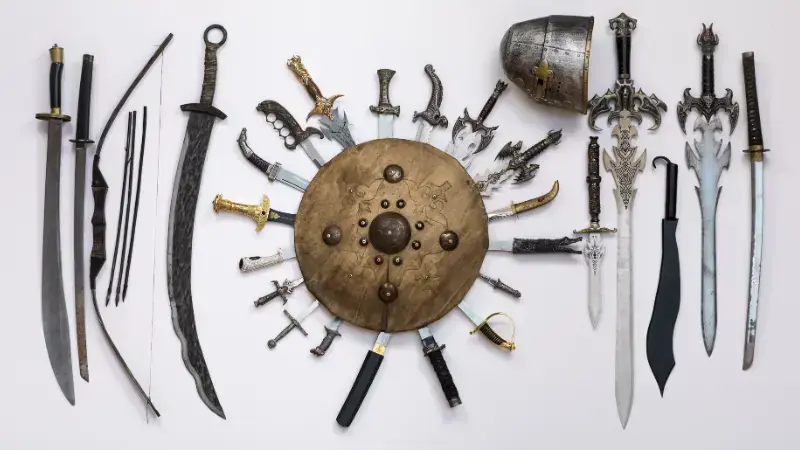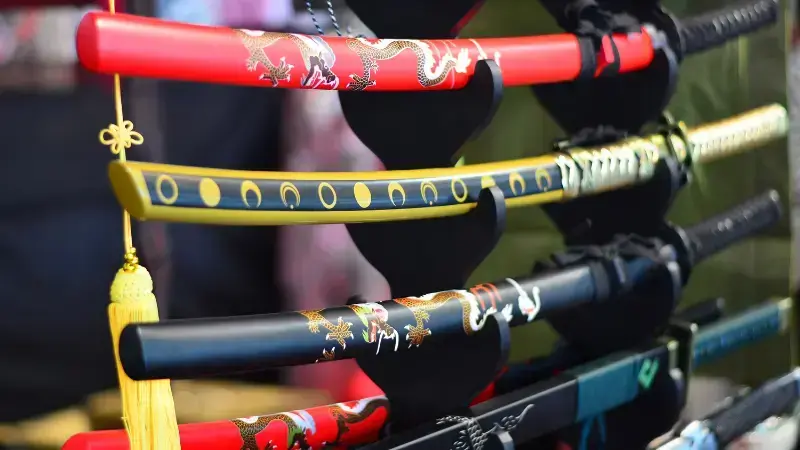The right to bear arms is enshrined in the US Constitution, but not everyone is allowed to own any weapon they choose. For individuals with felony convictions on their record, the legal restrictions on weapon ownership are stringent. Swords, in particular, are a unique weapon with a complex legal status that varies between states. Whether or not a felon can own a sword is a question that requires a nuanced understanding of the law.
What Is A Sword: Types And Classification

It is important to understand what the term ‘sword’ means. Swords can be broadly defined as bladed weapons that are designed for use in combat or other forms of physical confrontation. However, there are many different types of swords, each with their unique features and characteristics.
Different Types Of Swords And Their Characteristics
Some of the most common types of swords include the longsword, the short sword, the rapier, the sabre, the broadsword, and the katana. Each of these swords has a different design, length, and weight, and may be used for different purposes.
For example, the longsword is a two-handed sword that was common in medieval Europe. While the katana is a Japanese sword that is traditionally used in Japanese martial arts.
Classification Of Swords As Weapons
While swords may be considered historical or cultural artifacts by some, they are also classified as weapons by law enforcement agencies and the legal system. As such, they are subject to the same legal restrictions as other types of weapons, including firearms. This means that individuals with felony convictions may be restricted from owning or possessing swords, depending on the laws in their state or jurisdiction.
Sword Ownership Laws In The United States
The ownership of swords is regulated at the federal, state, and local levels in the United States. While the Second Amendment of the Constitution protects the right to bear arms, it does not provide unlimited access to weapons.
State Laws On Sword Possession
Individual states may have their laws regarding the possession of weapons by convicted felons.
For example, in California, convicted felons are prohibited from possessing any type of firearms, including swords. In contrast, in Texas and some other states, felons may be allowed to possess certain types of weapons, including swords, after a certain time has elapsed since their conviction.
Federal Laws On Sword Possession
Federally, the possession of firearms or ammunition by a convicted felon is prohibited under the Gun Control Act of 1968. However, the law does not specifically mention swords or other bladed weapons.
In addition to the Gun Control Act, some federal laws may impact the ability of convicted felons to own or possess weapons, including swords. For example, under the National Firearms Act of 1934, individuals with felony convictions may be prohibited from owning or possessing certain types of weapons, including short-barreled shotguns and machine guns.
Restrictions On Blade Length, Type, And Style
State laws may also place restrictions on the length, type, and style of swords that can be owned. For example, some states prohibit the ownership of swords with a blade longer than a certain length. Others may restrict ownership of swords that have a certain type of blade, such as a double-edged blade.
Can A Felon Own A Sword?

The legality of felons owning swords depends on the state where the felony conviction occurred and the ownership laws for swords in that state. Generally, felons are not allowed to own or possess weapons, including swords.
Exceptions To The Rule For Felon Weapon Ownership
There may be exceptions to this rule, such as when a felon is granted the restoration of their gun rights. However, these exceptions are rare and usually require the felon to demonstrate that they have completed their sentence, have been rehabilitated, and are not a threat to public safety.
The process of restoring rights can vary by state. In some states, felons must wait a certain number of years after completing their sentences before they can apply for restoration of rights. Once the application is filed, it may take months or even years for a decision to be made. When rights are restored, they can legally own a sword, provided there are no other legal issues. Like all rights, the right to own a sword depends on state laws.
Factors That Influence Restoration Of Rights
When considering a petition for restoring gun and weapon rights, the court will consider various factors. These may include the severity and nature of the original offense, the individual’s criminal history, and their behavior since the conviction. The court may also consider the individual’s need for a firearm or weapon. Such as if they work in a high-risk job or live in a dangerous area.
Legal Penalties For Felons In Possession Of Swords
Felons in possession of swords can face serious legal penalties, including additional felony charges and imprisonment. Penalties can vary based on the state where the offense occurred and the severity of the crime.
Implications For Probation And Parole
If someone who has been convicted of a crime is currently on probation or parole, having a sword in their possession could lead to a violation of their release terms and potentially cause further legal issues.
Carrying Sword In Public
People own swords for decorative purposes, while some are collectors. Katanas are owned by most Americans for home deco, picture poses, and other use.
Some states may allow felons to own a sword as long as it is not carried in public or used for illegal purposes.
Swords, most knives, and machetes are prohibited in public, especially in schools, religious gatherings, parks, and bars.
Historical And Cultural Symbolism Of Swords
While swords may be classified as weapons by law enforcement agencies and the legal system, they also have a rich historical and cultural significance around the world. From medieval knights to samurai warriors, swords have played a significant role in battles, wars, and other forms of physical conflict throughout human history.
Swords In Historical Battles And Wars
Swords have been used in a range of historical battles, from the Crusades to the American Civil War. Knights and warriors often used them to defeat enemies with skill and strength. However, the rise of firearms in the 19th and 20th centuries led to a decline in the use of swords in battles and wars.
The Spiritual And Symbolic Significance Of Swords In Cultures Around The World
Beyond their role in battles and wars, swords also have a deep spiritual and symbolic significance in many cultures around the world.
The katana holds a position of great cultural significance in Japan, symbolizing the values of honor, loyalty, and discipline. Likewise, in Western culture, swords have been held in high esteem as representations of knighthood, chivalry, and bravery.
Sword ownership restrictions for felons won’t erase the cultural significance of these artifacts. The historical and cultural reference it holds.
Conclusion

Felons who wish to own swords should fully understand the risks and rewards of doing so.
- The pros of sword ownership for felons include the ability to engage in sword collecting and other hobbies,
- while the cons include legal penalties and negative impacts on employment and civil rights.
There is ongoing debate about the ethics of allowing convicted felons to own weapons. Some argue that it is a basic constitutional right. While others believe that safety concerns should take precedence over individual rights. The debate is complex and multifaceted, but it’s important to consider all perspectives when discussing this topic.
In conclusion, the question of whether an ex-con can legally own a sword is not a straightforward one. The answer varies between states and depends on a variety of factors. However, there are significant legal, social, and ethical implications for felons who possess any weapon, including swords.
It is imperative to thoroughly assess the decision to own a sword with the assistance of legal counsel and a complete understanding of one’s legal rights and constraints.